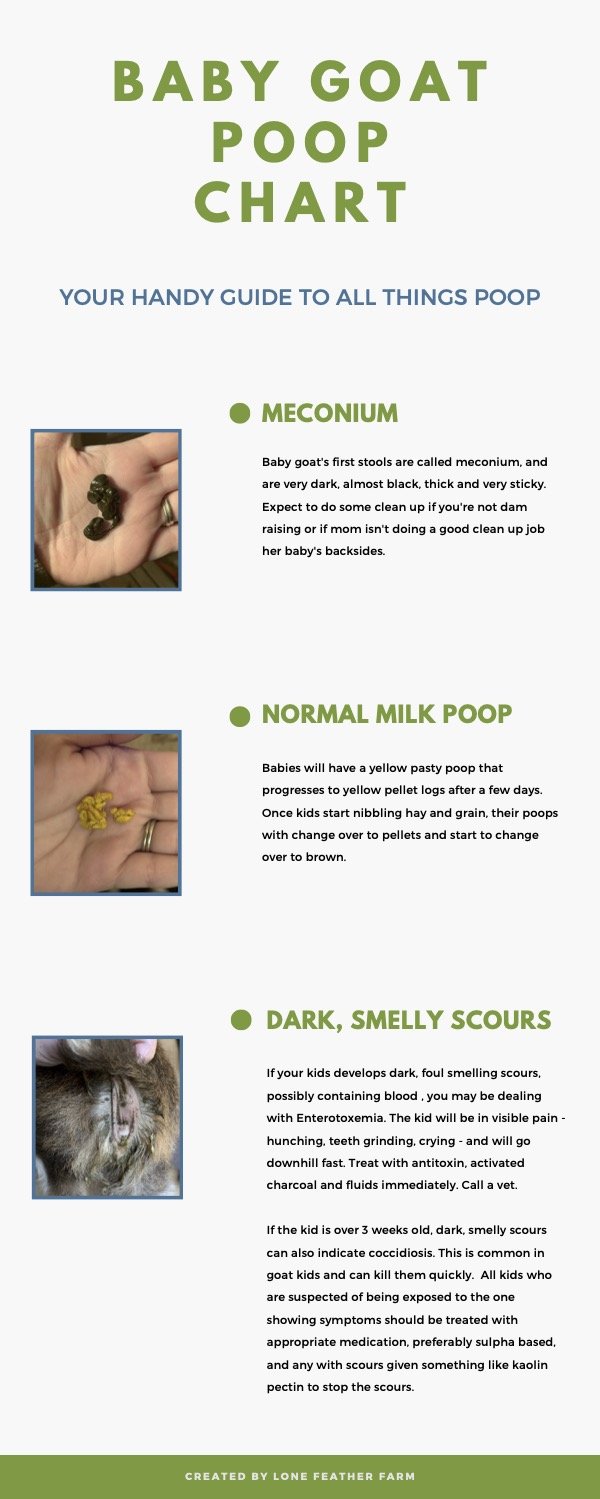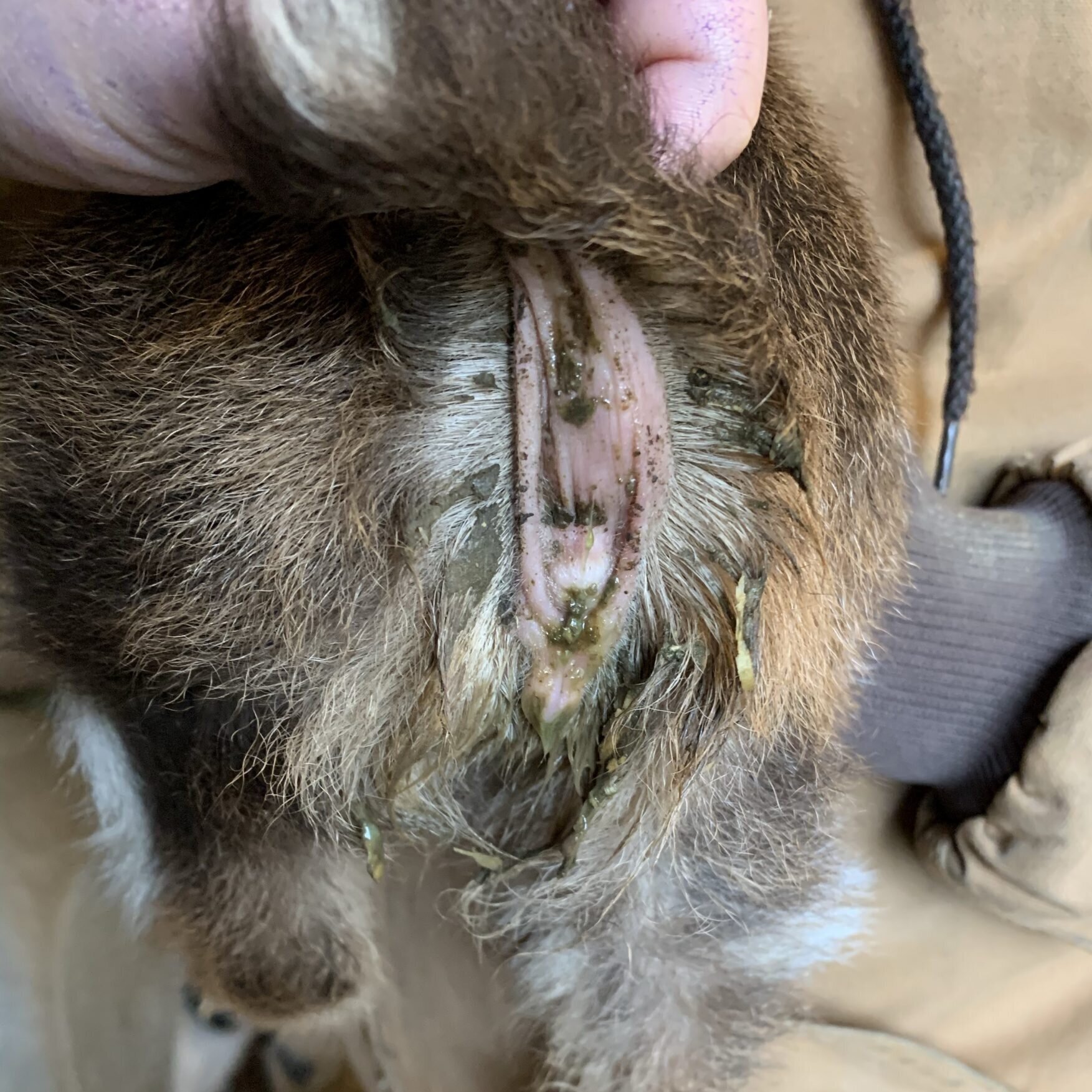Goat Poop Chart | The Scoop On Poop
When you have goats, sh*t happens. Literally. A lot. A goat's poop can tell you a lot about your goat's health. When your goat poop goes from healthy pellets to something else, pay attention and make sure you're on top of it. A handy goat poop chart (subscribe to our mailing list to get your free chart) can help you identify common problems that affect your goat's poop, and hopefully, help you fix it.
Irregular Goat Poop - Adults
Goat poop should normally be evenly shaped pellets. If they look different, you may have a problem on your hands. These are the common variations in adult goat poops.
goat poop pellets
Normal goat poop pellets
Pointy Pellets- These poops can often be missed, but when they're noticed, they sure do cause some head scratching. The pellets are mostly normal, but on one end they form a point. From what I understand, this isn't generally a cause for panic, and is thought to be caused from too much protein in the diet. They usually return to normal.
Clumpy goat poop
Pellet Log/Clumps - This can happen when a goat eats too much, has a change in feed, or at the beginning of an illness or parasite load. Usually these will turn around on their own, but may also indicate the start of an issue. Keep an eye out to identify the goat having "clumpies."
When goat pellets start to stick together and "clump", keep an eye on it
"Dog Log" - Like the name says, this poop looks a lot like a dog poop - a smooth log, sometimes on the soft side. This can also be caused by an upset in feed, but usually leans towards the start of a real issue. Figure out which goat is having these poops and take their temperature to rule out an infection. This would be a good time to grab a sample and have a fecal run in case of internal parasites.
Log goat poop
Pudding Consistency - This is usually the indication that full blow scours will be next. Try to resolve things at this stage if you can. Check your goat's temperature and get a fecal run. While you work on identifying the cause of the off poops, try to get the poop on track with some kaolin pectin or an herbal product.
Watery Scours - Diarrhea, or scours, can be very dangerous for your goats, causing them to dehydrate quickly. When this happens, make sure you stop feeding them grain immediately. Next, be sure to check their temperature to see if could be caused by an infection (fever) or a rumen shutting down (below normal temp). Try to identify the cause yourself. If you can't nail it down within 24-48 hours, call your vet. In the meantime, keep your goat well hydrated with electrolytes and try to stop the scours with kaolin pectin or herbal supplements.
meconium goat poop
Baby Goat Poop
Baby goat's first stools are called meconium, and are very dark, almost black, thick and very sticky. Expect to do some clean up if you're not dam raising or if mom isn't doing a good clean up job her baby's backsides.
A baby goats first poop, meconium, is dark and very sticky
baby goat poop
After that, babies will have a yellow pasty poop that progresses to yellow pellet logs after a few days. Once kids start nibbling hay and grain, their poops with change over to pellets and start to change over to brown.
Normal baby goat poop
Abnormal poops in baby goats should be taken very seriously. They usually indicate an illness that could kill them very quickly.
Watery Yellow Scours - One of the main causes of runny yellow poops in baby goats is overindulging on milk - this is called "milk scours". Sometimes a dam can be producing extra rich milk, or too much milk for too few babies, and babies will overeat. If the kids are on a bottle, that means cutting them back on the milk you're feeding. If they're with mom, try pulling mom out and milking her down at least once a day. If the scours persist or get worse, consult a vet as soon as possible.
Profuse Bright Yellow or Green Watery Scours - If you've ruled out milk scours, or the issue persists, you could be looking at an Ecoli infection. This is very serious and needs immediate treatment with hydration and antibiotics.
baby goat diarrhea
Dark, Foul Smelling Scours - If your kids develops dark, foul smelling scours, possibly containing blood , you may be dealing with Enterotoxemia. The kid will be in visible pain - hunching, teeth grinding, crying - and will go downhill fast. Treatment includes electrolytes, antitoxin, activated charcoal and possibly antibiotics. Entero can usually be avoided by giving their dam a CD&T booster 4 weeks before kidding. But that's not always 100% effective for the kids.
Baby goat scours can be very dangerous.
If the kid is over 3 weeks old, dark, smelly scours can also indicate coccidiosis. This is common in goat kids and can kill them quickly. All kids who are suspected of being exposed to the one showing symptoms should be treated with appropriate medication, preferably sulpha based, and any with scours given something like kaolin pectin to stop the scours.
Grey, Green, or Dark Tarry Stools - This could indicate a Salmonella infections. Consult a vet for immediate treatment.
Any Scours - When it comes to baby goats, any scours can be very dangerous. Pay attention. Because so many of these scours present similarly, don't let anything go for more than a day or two if the measures you're taking aren't working. Check temps frequently to see if you can detect a fever or sub normal temps - this can help you nail down what you're fighting.
No Poop - Sometimes, kids can get constipated. Usually this happens if they're not eating enough and get dehydrated. We've had it happen when kids have had to be in the house with the woodstove. Usually a kid will act a bit out of sorts and not eating well. A gentle enema of warm water and a drop or two of soap will help move along any blockage. We use a nasal bulb, fill it with the warm water, and gentle squeeze the water into the baby's rectum. You should also make sure the kid gets extra hydration to keep it from happening again.
Know Your Sh*t
Keeping a close eye on your goat's poops can help you catch a problem before it gets out of hand. Goats are prey animals, which means they can hide symptoms of illness until it's very serious. Seeing changes in their feces can give you the warning signs you need before things get serious.











